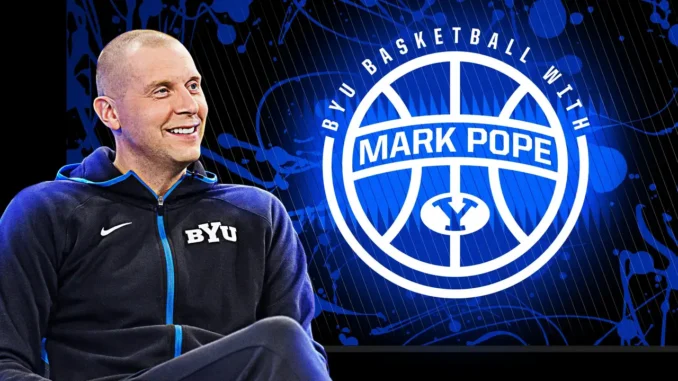
Mark Pope wants to be the ‘CLO’ of Kentucky basketball. What does that mean to him?
Kentucky men’s basketball coach Mark Pope talks to the media during the Wildcats’ media day on Tuesday, at Memorial Coliseum in Lexington. Pope spoke about adopting a Japanese proverb he recently learned. BY JOHN CLAY| UK ATHLETICS
At a luncheon for community leaders in Louisville over the summer, Mark Pope sat on stage in one of his first major speaking engagements as the new University of Kentucky men’s basketball coach and talked about the evolution of his own leadership style. The co-headliner of the event was Pat Kelsey — the new U of L men’s basketball coach — and the two future rivals listened intently as the other spoke, sharing the philosophies that helped bring them to this point in their careers. Toward the beginning of the talk — still months away from his first game as Kentucky’s head coach — Pope was asked about the fundamentals of great leadership. “When you step into these shoes, when you step into any leadership role — there’s immense pressure to try to be something else,” he said. “But being authentic is the best leadership strategy of all.”
To set up his larger point, Pope joked that it was “super dangerous” to invite he and Kelsey — both coaches known for their enthusiasm — to a lunchtime speaking event, quipping that the two of them might carry on until 7 p.m.

“One thing we can do is we can talk, right? But I think about this,” he continued, his voice shifting to a more serious tone. “I think about the C suite all the time. CEO and CMO and CFO and CIO. And really, I think the best leaders are CLOs — chief listening officers. I think that is a skill that is becoming increasingly lost in our leadership portfolios, and I think it’s tragic. Because I think the only way that we can lead is by listening. “In my particular case, it’s really important that I listen to my staff. If I’m up all the time — just barking out orders all the time — I’m missing out on the potential that we have to grow and the great ideas that are floating around the room, and the synergy that can happen on a staff. And if I spend all my time telling my players what to do, I can actually have no idea how to tell them what to do.” As Pope conveyed this thought, many in the crowd of nearly 1,500 attendees nodded along with him. Up on the stage, Kelsey clearly took it in, as well. When it was his turn to speak, the Louisville coach postponed his reply to the next question in order to return to Pope’s point first.
“You come to something like this to learn, right?” Kelsey said. “I’ll go and take back to my staff: CLO. I have a title as Head Basketball Coach, but I’m gonna talk to them about the chief listening officer. Mark said it exactly right. … He said ‘CLO’ — I am one of those now.”
POPE FINDS HIS PHILOSOPHY Kentucky’s new leader hasn’t always been the cool, calm, collected coach that he’s often portrayed as nowadays.
Mark Fox — an associate coach on Pope’s first UK staff — gave him his first job in the profession 15 years ago at Georgia, bringing him on as a member of the Bulldogs’ support staff. Fox has described Pope as an eager and willing young coach, obviously bright — he dropped out of medical school to go all-in on this pursuit instead — but he said he sat him down early in that first season and basically told him that he couldn’t get ahead of himself. If he wanted to have a long, successful coaching career, he’d need to learn the profession from the ground up. “No job was too small” for Pope, according to Fox, and the aspiring coach became a full assistant at Wake Forest the next season and spent four years as an assistant at BYU after that.
“Auggie! Auggie! Right here!
“It’s not ten,” he deadpans. “It’s right angles.” In a wide-ranging preseason interview with the Herald-Leader, the new UK coach went deeper into the evolution of his leadership style, one that’s based more on observation and less on barking orders. Pope — a national champion and team captain at Kentucky who spent six years playing in the NBA — was an assistant coach for six college seasons before getting the top job at
On a team with 12 new scholarship players, it led to the Cats coming together fairly quickly as communicators. “He’s still going to keep the standard at the highest level. We’ve never had an issue with our guys playing hard,” explained assistant coach Mikhail McLean, noting the difference between poor effort and poor execution. “These guys, from day one, they came in and they’ve been busting their butt, and they’re getting after it. So if that standard is not at the championship standard that we’re going for? Like, boom! He’s gonna correct that right away. That’s different, right? “But if a guy makes a turnover, most coaches are like, ‘Get on the line, run a sprint.’ Our guys are still going to run a sprint, but our players are telling them, ‘Hey, you turned it over. You need to go run a sprint.’ But before they address that, they’re like, ‘Hey, this is what you did wrong. This is how you correct it.’ And now they know, ‘OK, I’m gonna go get my sprint in on the side.’ So that’s different. … It’s very empowering. And it gives them a voice.”
Leave a Reply